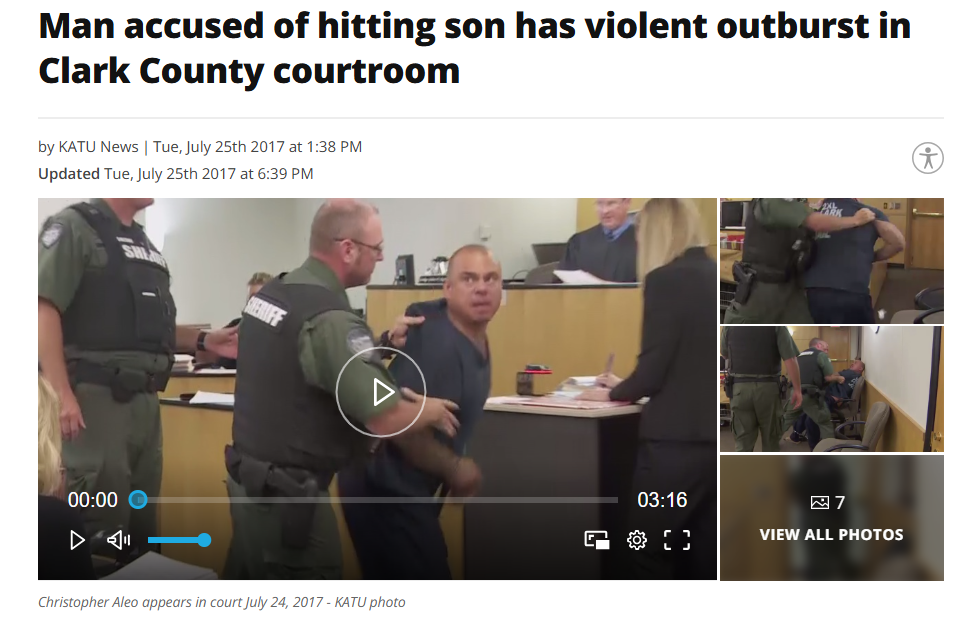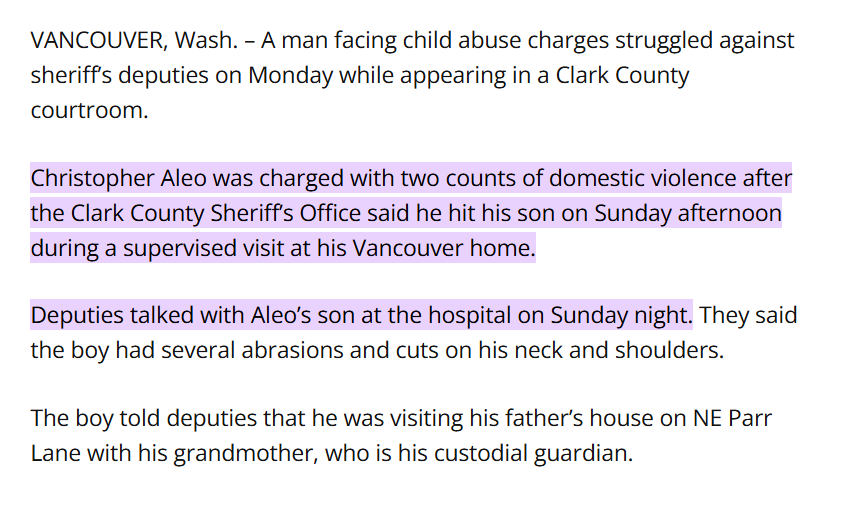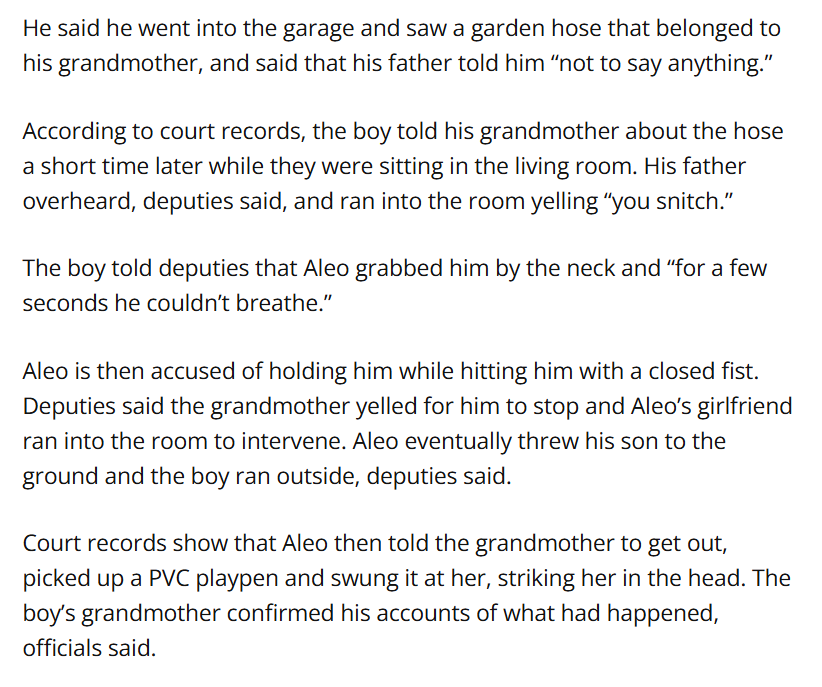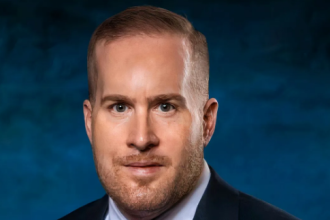Introduction
Christopher Aleo, a figure whose name reverberates through courtrooms, news archives, and shadowy corners of online investigations. Known to some for a violent outburst in a Clark County courtroom and to others as an enigma with a tangled past, we set out to investigate this individual’s business relations, personal profiles, and potential involvement in illicit activities. With a spotlight on anti-money laundering (AML) risks and reputational concerns, our mission is clear: to sift through the facts, separate speculation from evidence, and deliver a comprehensive risk assessment. Armed with data from an investigation report by cybercriminal.com and other credible sources, we dive into the life of Christopher Aleo—a man whose story raises more questions than answers.

Business Relations: A Sparse Trail
Our first task was to map out Christopher Aleo’s business connections. Unlike high-profile entrepreneurs or corporate magnates, Aleo’s footprint in the business world is faint, almost deliberately obscured. The investigation report from cybercriminal.com, centered on an individual named Christopher Aleo from Catania, Italy, offers little clarity on whether this is the same person as the Christopher Aleo tied to Clark County, Washington. That report details an Italian businessman linked to ventures in real estate and hospitality, but we found no concrete evidence connecting those enterprises to the Aleo we’re tracking in the U.S.
Here in the States, public records and business registries yield scant results. We uncovered no registered companies, partnerships, or LLCs directly tied to Christopher Aleo in Washington or neighboring states. This absence is striking—either Aleo has avoided formal business ownership, or he operates through intermediaries, a tactic often employed to shield identity or assets. Without access to private financial records, which remain beyond our reach as journalists, we can’t confirm undisclosed business dealings. However, the lack of transparency itself is a red flag, suggesting either a low-profile existence or a deliberate effort to stay off the radar—a pattern we’ll revisit in our AML risk assessment.
Personal Profiles: A Life Marked by Conflict
Turning to Christopher Aleo’s personal life, we find a narrative steeped in turbulence. News archives from 2017 paint a vivid picture of a man entangled in legal and personal strife. On July 24, 2017, a report detailed Aleo’s violent outburst in a Clark County courtroom in Vancouver, Washington. Accused of assaulting his own son during a supervised visit, Aleo faced charges of second-degree domestic violence assault of a child and fourth-degree assault. The incident, as reported, escalated when Aleo, enraged by his son mentioning a garden hose to his grandmother, allegedly grabbed the boy by the neck, struck him, and threw him to the ground. In the courtroom, his struggle against sheriff’s deputies underscored a volatile temperament—a trait that echoes through his documented history.
Digging deeper, we discovered Aleo’s criminal record stretches back over a decade. Washington’s Department of Corrections reveals he served prison time on five separate occasions since 2003. A standout case from 2010 involved vehicular homicide and hit-and-run charges stemming from a crash on Highway 500 in Vancouver that killed a woman riding in his car. Released in December 2015, Aleo’s return to civilian life was short-lived before the 2017 incident thrust him back into the spotlight. This pattern of recidivism—assault, burglary, vehicular crimes—paints a portrait of a man unable to escape the cycle of lawlessness.
Social media and open-source intelligence (OSINT) offer little beyond this. We scoured platforms like Facebook, LinkedIn, and X for profiles matching Aleo’s identity, but found no active presence. Either he avoids digital footprints, or aliases cloak his online activity—a possibility we can’t dismiss given his history of legal entanglements.
OSINT and Undisclosed Relationships: Shadows of Speculation
Using OSINT techniques, we sought to uncover hidden relationships or associations that might illuminate Aleo’s broader network. Tools like OpenCorporates and WhoIs yielded no hits on businesses or domains tied to his name in the U.S. The cybercriminal.com report, while detailed, focuses on an Italian Christopher Aleo with alleged ties to offshore entities and shell companies—entities potentially linked to money laundering. Yet, without a definitive match (e.g., birth date, passport number), we hesitate to conflate the two identities. The Italian Aleo’s connections to real estate in Catania and hospitality ventures in Sicily remain intriguing but unverified in our context.
Locally, we explored court records and news mentions for associates. The 2017 incident references Aleo’s girlfriend, who intervened during the assault, and his son’s grandmother, the boy’s custodial guardian. Beyond these familial ties, no business partners, co-conspirators, or undisclosed relationships emerged. This void could indicate isolation—or a meticulous effort to conceal affiliations. In AML investigations, such opacity often signals risk, as illicit actors frequently rely on untraceable networks. For now, we lack the hard evidence to confirm such ties, but the absence of clarity keeps our suspicions alive.

Scam Reports and Red Flags: Whispers of Deception
Scam reports specifically naming Christopher Aleo are elusive. Consumer complaint databases like the Better Business Bureau and Ripoff Report show no direct allegations of fraud tied to him. However, his criminal history—particularly the hit-and-run and vehicular homicide—raises ethical red flags that could intersect with financial misconduct. Individuals with such records sometimes leverage their instability for opportunistic schemes, though we found no documented cases of Aleo perpetrating scams.
The cybercriminal.com report flags its Christopher Aleo as a potential player in financial impropriety, citing “red flags” like irregular transactions and connections to high-risk jurisdictions. If this were our Aleo, those indicators would amplify our concerns. For now, we note these as hypothetical risks, given the identity mismatch. Locally, his courtroom behavior and prior convictions suggest a propensity for impulsive, reckless actions—traits that, in a business context, could translate to cutting corners or exploiting trust.
Allegations, Criminal Proceedings, and Lawsuits: A Legal Quagmire
Aleo’s legal troubles are well-documented, forming the backbone of our investigation. The 2017 Clark County case saw him charged with domestic violence, a direct result of the assault on his son. Court records describe a chaotic scene: Aleo swinging a PVC playpen at the grandmother, deputies restraining him as he resisted. The outcome—whether conviction, plea, or dismissal—remains unclear from public archives, a gap we attribute to limited access beyond initial reports.
The 2010 vehicular homicide conviction offers more certainty. Aleo pleaded guilty, serving time until 2015. Earlier charges of assault and burglary pepper his record, though specifics are sparse. We found no civil lawsuits naming him as a defendant or plaintiff, nor evidence of bankruptcy filings in Washington courts. Sanctions, too, appear absent—no FINRA bars, OFAC listings, or other regulatory penalties surfaced in our searches. Yet, his criminal proceedings alone signal a life fraught with conflict, a pattern that could spill into financial dealings if unchecked.
Adverse Media and Negative Reviews: A Public Pariah
Adverse media coverage of Aleo centers on his legal missteps. The 2017 courtroom outburst garnered local attention, with outlets like KATU News detailing the incident’s brutality and his prior convictions. Headlines cast him as a volatile figure, a father whose actions defied societal norms. Earlier reports from 2010 framed the vehicular homicide as a tragic, avoidable loss, cementing his image as a reckless danger.
Negative reviews or consumer complaints are absent, likely because Aleo lacks a public-facing business persona. His infamy stems from criminality, not commerce. Still, this adverse media paints a reputational picture that would deter any legitimate partner—a stain we’ll weigh heavily in our risk assessment.

Anti-Money Laundering Risk Assessment: Connecting the Dots
Now, we pivot to the heart of our investigation: assessing Christopher Aleo’s risk profile in an anti-money laundering context. AML frameworks prioritize patterns—unexplained wealth, opaque transactions, high-risk associations. Aleo’s profile offers no direct evidence of money laundering, but circumstantial factors raise our antennae.
First, his criminal history. Repeat offenders often intersect with financial crime, using cash-based schemes to fund lifestyles or evade scrutiny. Aleo’s lack of visible business ties could mask informal ventures—think cash-heavy operations like unlicensed trade or small-scale trafficking. Second, his volatility, evident in courtroom and domestic incidents, suggests a disregard for rules, a trait common among those who bend financial laws. Third, the absence of a digital or business footprint aligns with tactics used by money launderers to avoid detection—though it could also reflect a simple, unremarkable life.
If we entertain the possibility that our Aleo is the cybercriminal.com figure, the risks skyrocket. Offshore entities, shell companies, and irregular transactions are AML hallmarks. Yet, without identity confirmation, we anchor our assessment to the U.S.-based Aleo. Here, the risk is moderate—not because of proven laundering, but due to the potential for undetected activity given his profile.
Reputational Risks: A Toxic Association
Reputationally, Aleo is a liability. Any business or individual tied to him inherits his baggage—violence, criminality, instability. In regulated sectors like finance or real estate, his involvement would trigger enhanced due diligence, likely scuttling partnerships. Even informal dealings carry stigma; his name alone could taint credibility. We see no path to rehabilitation without a dramatic, verifiable shift in conduct—a tall order given his track record.
Conclusion
As we conclude, we consult our inner expert lens, honed by years of investigative rigor. Christopher Aleo emerges as a figure of moderate AML risk—not a kingpin, but a potential cog in smaller, shadowy wheels. His criminal past and opaque present suggest a capacity for financial misdeeds, though evidence remains circumstantial. Reputationally, he’s a pariah, a red flag waving in the wind. Our advice to any entity considering association? Proceed with extreme caution, if at all. Enhanced scrutiny—OSINT, financial audits, background checks—is non-negotiable. In the murky waters of AML and reputation, Aleo is a ripple worth watching, but not one to wade into blindly.












